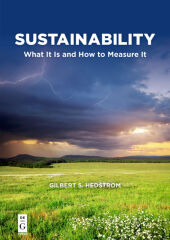 Neuerscheinungen 2018Stand: 2020-02-01 |
Schnellsuche
ISBN/Stichwort/Autor
|
Herderstraße 10
10625 Berlin
Tel.: 030 315 714 16
Fax 030 315 714 14
info@buchspektrum.de |

Sustainability
What It Is and How to Measure It
2018. XXX, 305 S. 12 b/w ill., 10 b/w tbl. 240 mm
Verlag/Jahr: DE GRUYTER; DE G PRESS 2018
ISBN: 1-547-41660-2 (1547416602)
Neue ISBN: 978-1-547-41660-8 (9781547416608)
Preis und Lieferzeit: Bitte klicken
Sustainability: What It Is and How to Measure It begins with a succinct business-focused summary of how to think about the risks and opportunities associated with sustainability. The author then includes his proprietary framework, The Corporate Sustainability ScorecardTM C-suite rating system, including the over 140 key sustainability indicators that are used to rate an organizationīs sustainability efforts. Each KSI includes examples from organizations around the world, giving the reader a complete and unbiased understanding of all aspects of sustainability. The Scorecard has been developed over the past 20 years and used by more than 70 corporations to rate themselves on sustainability. Gilbert S. Hedstrom illustrates the use of the Scorecard with hundreds of examples. He discusses sustainability transformation, governance, and strategy and execution. Social responsibility and environmental stewardship form important parts of his discourse in this important contribution to the debate on sustainability that will benefit business executives and those interested in sustainability and business. Read the authorīs related article on the NACD blog here: https://blog.nacdonline.org/posts/pge-lessons-oversight
In his new book, Sustainability: What It Is and How To Measure It, consultant and author Gib Hedstrom wisely observes the salient selling point for many businesses when ruminating on how to address sustainability. From 2015 to 2030 the global middle class will double in size from 2.5 billion people to about 5 billion people. As Hedstrom wryly notes, in most of his meetings with corporate boards, eyes begin to glaze over when presented with some of the dry facts about sustainability but the growth of the global middle class grabs their attention. Hedstromīs observation underscores what noted economist and professor Jefferey Sachs has posited regarding sustainability - economic policy works best when it focuses simultaneously on three big issues: first, promoting economic growth and decent jobs; second, promoting social fairness to women, the poor and minority groups; and third, promoting environmental sustainability. Thus, the key challenge is how to understand the sustainability concept in its many guises, emphasizing the opportunity side of the equation (economic growth and jobs), and then presenting a complete system that enables a company to accurately measure itself. Itīs a compelling two-step process that could be the one-stop shopping many executives need in order to tackle what may be the most pressing issue of our time. Hedstrom comes to the task unusually qualified: he spent 20 years at consulting firm Arthur D. Little, advising CEOs and board members about how to handle thorny environmental and business challenges. From 2004, with the establishment of his eponymous consulting firm, Hedstrom continues to assist the corporate community on sustainability issues. He also has served as program director for two sustainability committees at The Conference Board, which is how I came to know and appreciate Gibīs unique capabilities and thought leadership. Key to the book is Hedstromīs proprietary Corporate Sustainability Scorecard(TM), a C-suite rating system developed over the course of 20 years and employed by more than 70 Fortune 500 companies. Whether you are new to the field of sustainability or an experienced veteran, Sustainability: What It Is and How To Measure It, may prove to be the invaluable reference book on the most challenging issue of our time. --Michael FanningFormer global head of sustainability, Michelin Group, andFormer president, Business Partnership Foundation, USC Darla Moore School of Business


